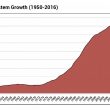
(Photo courtesy of Brennan Center for Justice) “Chart depicting the U.S prison system growth in the past 66 years.”
Nate Coady
Connector Staff
It will not come as a surprise to many people that America has the highest incarceration rates of any country. The issue of mass incarceration is something that has plagued the nation since the 1960s, with its origins of truth in sentencing laws and tough-on crime rhetoric.
America’s prison sentences are notoriously long and crime prevention has been increasingly politicized. The result of this is a shockingly high number of people being held in prisons across the nation. The Bureau of Justice Statistics has said, “At year end 2021, an estimated 5,444,900 persons were under the supervision of adult correctional systems in the United States, a decline of 1% (down 61,100 persons) from year end 2020.” About 1.2 million of those people are held in prisons, the rest are serving parole or probation.
The problem with parole and probation in relation to mass incarceration is what UMass Lowell Criminal Justice Professor Jason Rydberg calls “net widening.” People on probation or parole are subject to rules that are “only illegal for that person.” For example, someone on probation might be in violation of their guidelines for going within a certain distance of some place, a rule that would not apply to free citizens. These technical violations imprison people for what would otherwise be a noncriminal act.
A growing issue is how mass incarceration affects minority populations. There are many policies in place around the country that seem race-neutral on paper but are applied in a racist manner when carried out by some police officers. However, Dr. Rydberg says that “future offending has much more to do with behavior and actions than who you are.” The example he gave is that a negative attitude toward work or school is much more of a predictor of criminal behavior than race or ethnicity. Yet, members of minority groups are “much more likely to come face to face with police,” says Dr. Rydberg.
Recidivism is the term used to define reentry into a correctional institution. This can be a tough statistic to measure because it is hard to pinpoint what constitutes reentry into the system. Is it rearrest? Is it reconviction? Is it when they reoffend? Dr. Rydberg defines it as, “a reversion to a behavior.”
This is an important statistic to track because, at the end of day, the purpose of the correctional system is to reform criminals so that, upon reentry, they can function as a member of society. Recent studies done by the Pew Charitable Trusts show that prisoners who are supervised upon release (people serving the rest of their sentence on parole for example) are less likely to revert to criminal behavior than those who are released with no supervision.
Those people’s cases are referred to as “max-outs.” They are the people who serve the entirety of their sentences in prison and upon release “[t]hese inmates do not have any legal conditions imposed on them, are not monitored by parole or probation officers, and do not receive the assistance that can help them lead crime-free lives,” according to the Pew research report. Therefore, after they are released, they are more likely to reoffend and be reincarnated than people under supervision.
Studying recidivism poses inherent difficulties. Scientists would have to track participants for years or, in some cases, decades. Dr. Rydberg says it is “hard to pull off.”
Another more recent problem with America’s issue of mass incarceration is the privatization of the prison industrial complex. Statistics provided by the Sentencing Project, a Washington D.C. based research center, show how some states have moved alarmingly toward the privatization of prisons. For example, according to their research, about 48% of prisoners in the state of Montana are held in private prisons.
Dr. Rydberg says, “the general concern is that it creates perverse incentives… there is pressure to create a flow of bodies.”
Now, more than ever, in an age of extreme scrutiny on the justice system, mass incarceration has humanitarian and advocate groups calling for reform. However, because of the sheer number of people already incarcerated, Dr. Rydberg says, “combatting [mass incarceration] on a nationwide scale is a formidable task.”
This post was originally published on this site be sure to check out more of their content.








